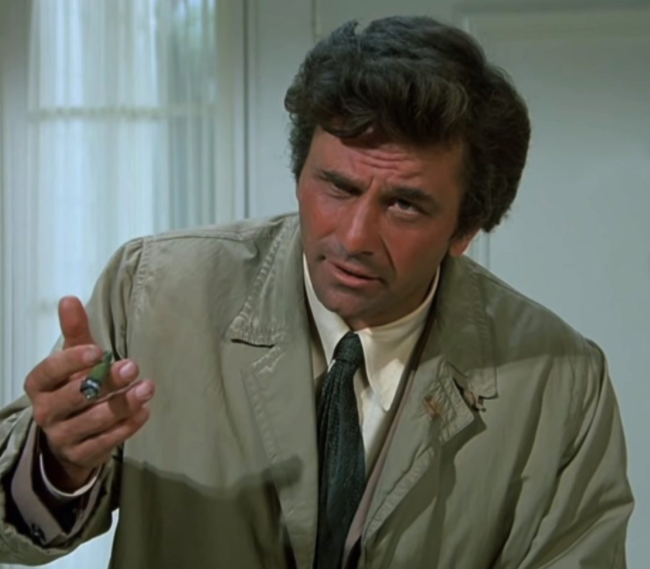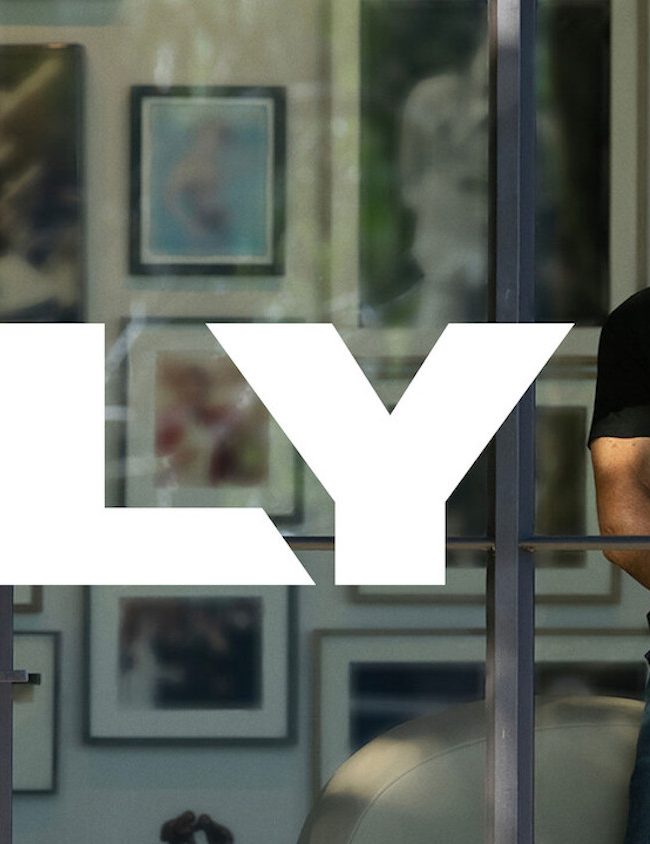A Conversation with Thom Zimny (SLY)
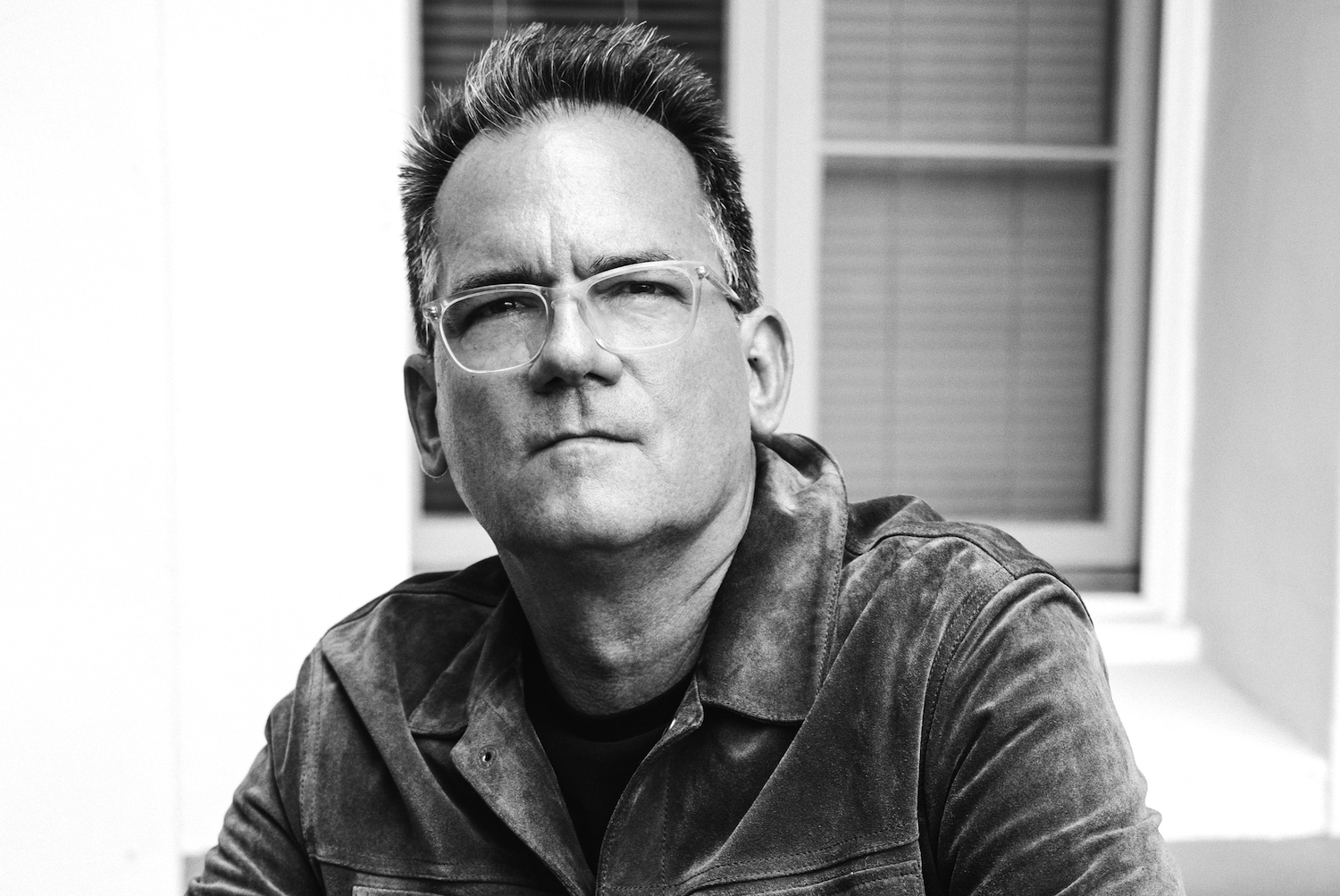
Director Thom Zimny (Western Stars), after a career spent making music videos (mostly for Bruce Springsteen) and music-focused documentaries, now turns his attention to Sylvester Stallone, with his latest, Sly (which I also reviewed). In it, Zimny follows the trajectory of his subject from unknown wannabe to global superstar, allowing Stallone full reign to share as many vulnerabilities as strengths. It’s a solid, in-depth look at a man who helped define the muscular cinema of the 1980s, but is also much more than just brawn. At the start of October, just after the film’s premiere at the Toronto International Film Festival, I had a chance to talk to Zimny via Zoom, and here, now, is that conversation, edited for length and clarity.
Hammer to Nail: How did your previous work documenting the lives and journeys of artists like Bruce Springsteen, Johnny Cash, and Elvis Presley prepare you for this new film?
Thom Zimny: When I think back on making Sly, I carried with me all the other films, but I was not prepared for the force that is Sylvester Stallone. I found myself in the presence of a Renaissance man, and a man who had energy that I couldn’t really contain and put into a chair and do a traditional interview. I had to jump on the train that was Sly and get into that energy and have a conversation and be ready to change subjects, be ready to push and provoke. Sly was like no other film process that I had done, because I was in his home, literally unpacking his life and having four/five-hour conversations with him that covered all the details. So in some ways, I carried along my film history, but in many ways, I was thrown into a whole new space.
HtN: What surprised you the most in making this film? What did you learn about Stallone that you didn’t expect?
TZ: The thing that surprised me the most was how much of his life was reflected in the body of work and how he was unpacking a lot of the things that had happened to him as a child and putting those things in the scripts. He had a very hard and troubled childhood, but he would create narratives, like the “Rocky” narrative, which gave the viewer a sense of hope. So I suddenly looked at his body of work as an extension of him, in many ways, exploring his makeup, his upbringing. When it came to looking again at things like Rocky and Rambo, everything changed after talking to Sly. I realized that he was a Renaissance man who was not understood and that these were films that were much deeper than I think the audience grasped at the time. In my conversations with him, I was able to pull out details that changed the work.
HtN: I didn’t realize how much of a writer he was. I knew he wrote Rocky and Rocky II, but I didn’t realize, until watching your documentary, how much he thinks of himself as a writer. That was my big takeaway. And I agree that it was interesting to see how much of his own life he put into the Rocky films, especially.
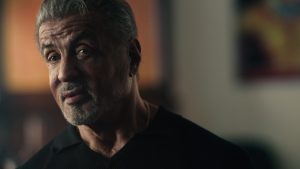
A still of Stallone from SLY
TZ: I’m so glad to hear you say that, because I recognized some of the same things that I saw with Bruce Springsteen, who had notebooks of songs; Sly had notebooks of scripts. And to see his process—the handwritten scripts—to see how a line would end up in a movie, it gave me an understanding of the power and the musicality of his dialogue. All his scripts had that.
HtN: I find it fascinating that he is so fixated on having the hero always win at the end, and yet in the film that put him on the map, Rocky loses. I mean, he has a moral victory and a romantic and emotional victory, but he actually loses the match. That’s quite the irony.
TZ: One hundred percent. What I love about the ending of Rocky is how the filmmaker Sylvester Stallone decides to challenge the classic Hollywood form where the boxer wins at the end and gets the girl and walks away. He goes for an idea that is much bigger. He sets you up, emotionally cheering, but you’re cheering for the development of a character who’s accepted in the world, who’s feeling love for the first time. For me, when I look at Sly, the filmmaker, I think that was a great way to take down the Hollywood cliché of the boxer, and it also demonstrated who he was as an artist and commented on his childhood, when he was misunderstood, and in many ways the Rocky character’s success reflected Stallone’s early success as a filmmaker. The Rocky films became a vehicle to explore the deeper part of Sly’s life.
HtN: How did this particular project come to you? Braden Aftergood, Sly’s producer, is the one who brought it to you, correct?
TZ: Yes, it came to me through Braden, who works with Sly directly, and he saw some of my work with Bruce Springsteen and connected to it and brought it to Sly’s attention and they set up a meeting and I met Sly in L.A. And right at the very beginning of being in the room with Sly, that dictated how I wanted to make this film. I knew that he was full of energy, just from that meeting. I knew that there was no putting him in a chair, sitting down. He had to be standing, more spontaneous.
HtN: Speaking of Stallone’s presence in front of the camera, you often choose to photograph him using a handheld camera for some of these “man in the house” interviews. What motivated that choice? Is it because he’s just so kinetic and is moving around so much?
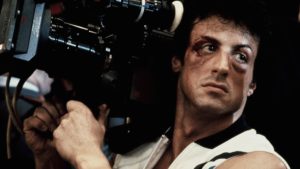
Sylvester Stallone in Sly.
TZ: I knew, after meeting Sly, that I would have to go in there with basically no crew. There would just be a cameraman and myself. And I knew that I had to have the space lit in a way where he could go anywhere, so I went in in advance and lit in a way that would read as not being lit, but also could just have him in any space in the room. I knew that the language of the camera had to be handheld to keep up with him. I used the environment and I used the handheld camera to give the viewer that feeling of conversation. I didn’t want it to feel like I had a list of questions and I was checking off all the boxes about his career. And I never usually include my own voice, but in this film I did a couple of times because it just demonstrated the conversations we were having, and how sometimes I would challenge him. Or he would challenge his younger self, like when we were listening to the cassette of past interviews. That gave it a very vérité feel.
HtN: How much of the archival footage that we see in the film were you able to get from Sly, himself? There’s so much great archival in there.
TZ: The beauty of this film is that I had this collaboration with Braden Aftergood where he would tell me about certain things. The cassettes were one of them, and they became a key element to find the voice of Sly as a young actor, being natural and a young artist and not talking in soundbites. Braden was definitely a source to remind me of those treasures.
But I also had an amazing team, who tracked down a ton or archive that represented things that would tell the story but felt like they weren’t things we had seen. And Sly himself also participated in this. He sent me, by phone, videos of his dad that I ended up using in the film, and that was a great gift because it gave the film this personal moment of seeing his dad at the end of his life and the deep connection that they had and also some of the pain that you see in the story. And Sly would also send me stills of his early days of acting. And in my edit room, I would just cover the walls with photos, and one day I had Sly come to that room, where we did one of the interviews.
HtN: In working so closely with Sly and his producer, what challenges did you face as a filmmaker in perhaps wanting to show your subject, flaws and all, when you have such a close personal relationship with him behind the camera?
TZ: I think that it wasn’t hard for me to show a full picture of Sly. There are moments of him discussing regret that he wasn’t with his family more when he was focused on films. I never felt for a moment that I had to hold back on an idea based on my communication with Sly or the time I had spent with him. If anything, I felt like I owed the film that level of honesty. I was chasing after bigger ideas—I was chasing after story points that gave you a sense of the man—and I wasn’t afraid to lose that connection with Sly if I told a certain fact. I was hoping he would walk away and say, “It’s a real experience of who I am.” And that’s actually what he said to me when he screened it. And that includes the beauty of his life and some of the flaws and mistakes. Having him talk about things so honestly was the guiding force for my edit. He was giving me the truth, where he discusses the idea of regret or fear or not being understood. So I owed the film that same level of honesty and attention to detail.
HtN: Well, thank you so much for making it and for talking to me!
TZ: Thanks so much!
– Christopher Llewellyn Reed (@ChrisReedFilm)
Netflix; Thom Zimny; Sly documentary movie review








